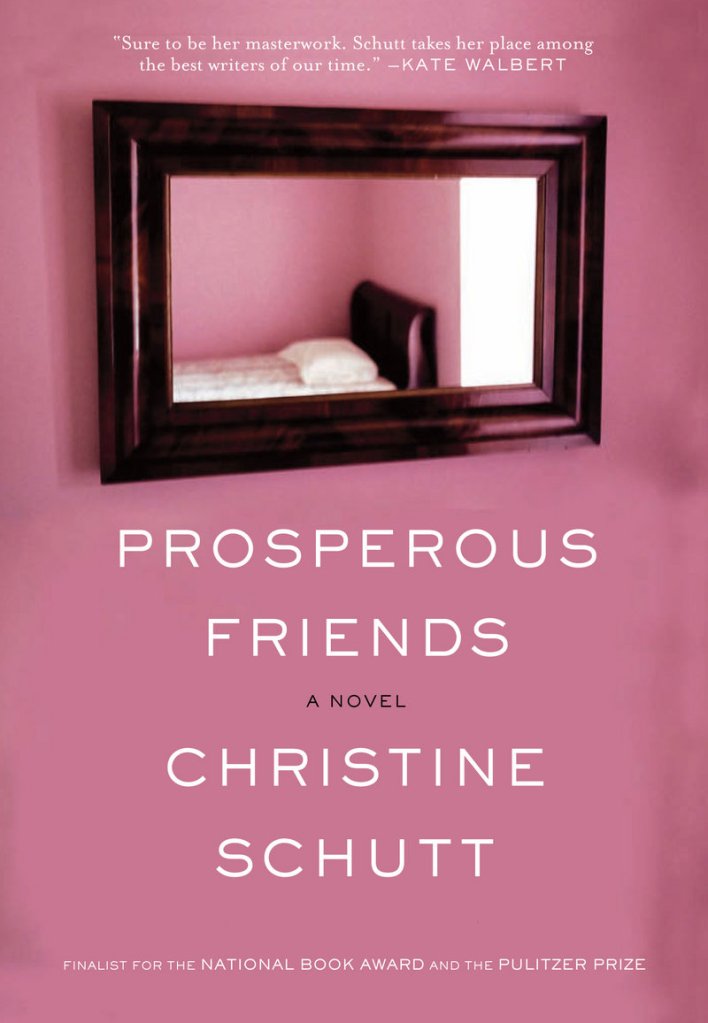If Christine Schutt lacks the name recognition of some authors, she has earned the acclaim that many seek. Her previous novels were chosen as finalists for the National Book Award in 2004 and the Pulitzer Prize in 2009.
Flirting with greatness may well be an occupational hazard for this Blue Hill author. It’s certainly a theme in her provocative new novel.
“Prosperous Friends” is a meditation on marriage, aspiration and art, featuring two couples who provide distinct templates of sorts.
We first meet the handsome younger couple, Ned and Isabel Bourne, post-Vassar and Columbia, in their mid-30s, living in London. Both are writers — Ned, promising and accomplished, with a fellowship and book in progress; Isabel, less so.
Their marriage is a minefield, constantly erupting. Between Isabel’s “big cries” and the ennui they share — “I need to be happy more of the time,” he says; “I’m not the person I wanted to be,” says she — they often sound like overgrown adolescents. Angst and infidelity are key themes as they try to outdo one another in misery as well as everything else.
Enter the second couple, Clive and Dinah Harris, a painter-poet duo who have settled into their imperfect union with its mixed and bountiful results. Clive is a vain, selfish and imposing artist who is well-known on their Maine peninsula, still sturdy and attractive in his 70s. Dinah, 60, is truly his better half, softening his hard edges and reminding him of the world beyond himself.
What links these two couples is their chance meeting at a wedding where Isabel and Clive start an unlikely dalliance. One thing leads to the next, and Clive is inviting Isabel to model for him in his Maine studio the following summer. The Bournes take Clive up on his offer, and plan to spend the summer in coastal splendor.
Of course, things don’t work out quite as planned.
Instead, the author has other ideas that prove more intriguing. Schutt creates a playground for her characters to mingle and roam, mirror and reflect one another. The process is nearly sculptural: Some characters gain depth and dimension, while others seem to shed substance.
Ned and Isabel seem muddled and tentative through much of the book, lacking a center. In a pact with college roommates, Isabel once promised “to be purposeful, employed, well-traveled.” Yet now, in the presence of the older, more established couple, the Bournes seem even smaller and more constrained.
Schutt has devised a small cast of characters who are challenging more than likable, flawed to a fault. Self-absorption, entitlement and adultery are among the norms here — givens, like weather or air.
Still, the author intervenes in lovely and unpredictable ways. Her shifting, prismatic view of the characters often has a transformative effect; she makes us care about these people, notwithstanding their shenanigans.
Further, her depictions of people and places are themselves, at times, a revelation.
“If a street had seasons, White Street was early spring,” she writes, “too colorless, hardly sentimental, no budded touches, nothing risen but March, secular and cruel.”
This is an unsettling book that is by turns, grim, scathing and droll. Watching it unfold in the presence of an author who is part poet and part sculptor is its own reward.
Joan Silverman of Kennebunk is a freelance writer.
Send questions/comments to the editors.



Success. Please wait for the page to reload. If the page does not reload within 5 seconds, please refresh the page.
Enter your email and password to access comments.
Hi, to comment on stories you must . This profile is in addition to your subscription and website login.
Already have a commenting profile? .
Invalid username/password.
Please check your email to confirm and complete your registration.
Only subscribers are eligible to post comments. Please subscribe or login first for digital access. Here’s why.
Use the form below to reset your password. When you've submitted your account email, we will send an email with a reset code.